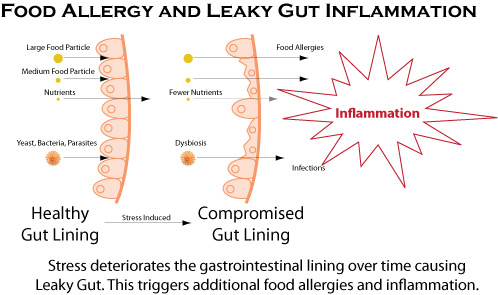Gut Inflammation
The digestive system plays a major role in food digestion as well as absorption of nutrients into the blood stream. It is important for the overall functioning of the body. When the digestive system is not working properly it can lead to development of gastrointestinal diseases and illnesses.
The bowel wall can be destroyed by conditions such as Crohn’s disease, inflammatory bowel diseases and ulcerative colitis. The conditions lead to poor absorption of nutrients, weight loss, abdominal pains, rectal bleeding among others. To correct the situation a patient is required to undergo surgery in most cases.
Cytokines
They are chemical messenger that act as signals for the immune system and neuromodulators. Cytokines can be either anti-inflammatory or pro-inflammatory. An imbalance in cytokines cause autoimmune disorders.
Cytokines are in form of proteins as well as glycoproteins that regulate immune functions and inflammation. They enhance the growth of cells as well as their differentiation and death.
Homeostasis in the intestines highly depends on the ability of the immune system of the intestines to withstand micro flora while at the same time providing protection against bacterial invasion. Normally, the dendritic cells of the gut induce T-cells differentiation.

T-cells produce secretions that enhance suppression of cytokines that in turn prevent abnormal immune responses. Pathogens enhance a response that triggers activation of immune cells and this ends up causing inflammation.
Inflammatory cytokines like IL-1ß, IL-2, IL-6, IL-15, IL-21 and TNFa stimulate T-cells that are cytotoxic. These are the ones that attack the gut mucosa. The mucosa is the lining of the small intestines. When cytokines attack the mucosa it can lead to conditions such as inflammatory bowel syndrome, Crohn’s disease. It can also lead to leaky gut syndrome.
The small intestines are useful not only in food digestion but absorption of nutrients from the digested food into the blood stream. When the small intestines re affected the digestive and nutrition functions are affected too.
Some immune system aspects aid in the suppression of inflammation aspects and thereby inhibiting destruction of tissues that is caused by active T-cells. This is made possible by T regulatory cells that work to counterbalance the active T-cells that attack the mucosa. T regulatory cells reduce the risks of getting immune diseases that end up attacking the tissues of the body like Crohn’s disease and rheumatoid arthritis.
Natural Compounds That Target Pro-inflammatory Cytokines
Besides the T-regulatory cells, there are several natural compounds that can also work to suppress the cytokines that cause gut inflammation.
Curcumin: studies have shown that curcumin acts as an agent of anti-inflammation. Curcumin works by targeting a number of cytokines that are responsible for gut inflammation. These cytokines include among others IL-1, IL-2, IL-6, IL-21 and TNFα. Curcumin combines with cyclosporine to bring about this effect.
Fish Oil: it contains properties of anti-inflammation. These properties have been shown to have the ability of suppressing cytokine that cause inflammation like IL-1, IL-2, IL-6, IL-15 and TNFα. The Omega-3 property in fish oil is responsible for this.
Studies have shown that Omega-3 suppresses these inflammatory cytokines that lead to gut inflammation. In addition to this, fish oil stimulates the body to produce anti-inflammatory cytokines that enhances a decrease of cytotoxic T-cells.
Resveratrol: just like the other natural compounds, resveratrol works by suppressing inflammation causing cytokines. Such cytokine include; IL-1β, IL-2, IL-6 and TNFa. It works by reducing the ability of the T-cells to reach the gut mucosa. This thereby inhibits gut inflammation.
Trans-Resveratrol: it is used to reduce the activation of T-cells in the body. This is by suppressing cytokines involved in activating inflammation agents.
Tea Polyphenols: both black and green tea contains compounds that have been shown to act as strong agents of anti-inflammation. The compound in the tea inhibits the activations of cytokines such as IL-1β, Il-2, IL-6 and TNFα which cause inflammation of the gut.

Quercetin: this natural compound is found in things like onions, citrus fruits, apples and grapes. The compound inhibits the activation of inflammatory cytokines like IL-1β, IL-2, IL-6, IL-15 and TNFα.
Vitamin D3: Vitamin D3 works as an anti-inflammatory compound when it comes to gut inflammation. It has been shown to control inflammatory toxics like IL-1β, IL-6 and TNFα which affect the mucosa causing inflammation.
High Proanthocyanidin Grape Seed Extract: grape seed contain a certain compound that is used to reduce the level of Th17 in the body. It also controls immune responses that tend to be aggressive in nature. It controls the differentiation of active T-cells serving as an autoimmune disease and inflammatory agent.
N-Acetyl Cysteine: this compound when combined with vitamin B lowers the levels of homocysteine thus improving the functioning of endothelial. It also works by suppressing the active inflammatory cytokines like TNFα in patients who receive lung transplants. TNFa makes a patient’s body reject transplants but in combination with vitamin B this is no longer a problem.
Contact Dr. Dalal Akoury today, for more information about gut inflammation. For more wellness and awareness tips just visit www.awaremednetwork.com today. AwareMed is the place to be to find any information about health.
Gut Inflammation and Cytokines








0 comments
Write a comment